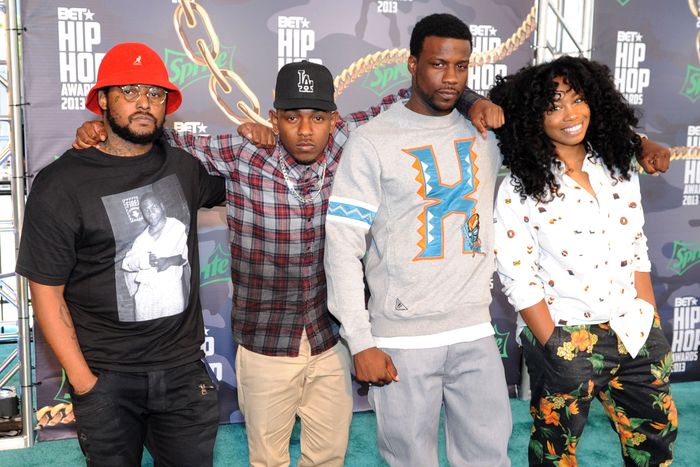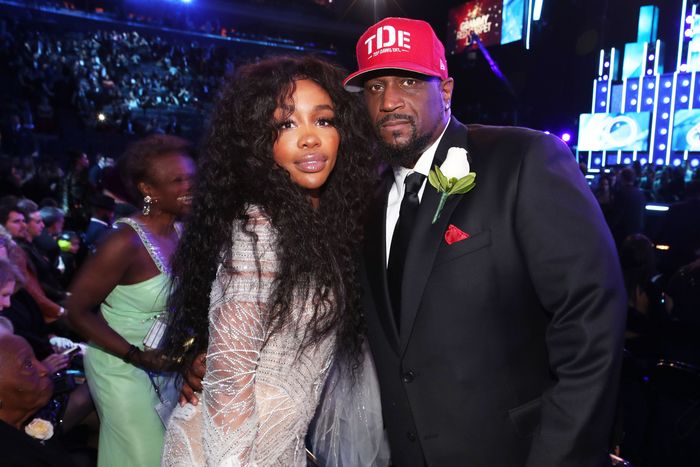
This week, Kendrick Lamar released Mr. Morale & the Big Steppers, his first record in more than five years. It’s also the final one he issued through Top Dawg Entertainment, the label he has been with since 2005. There is a long history of rappers getting locked into interminable deals by vulture-ish executives. This was different: a partnership between Black Angelenos forged far outside the major-label system. In fact, there is no Kendrick Lamar music available to the public that does not fall under its scope, at least not per se — the last time the Compton-bred rapper recorded for anyone else, he was a 16-year-old named K-Dot trying to growl his way through beats repurposed from the first Lloyd Banks album.
Yet for the first half-decade that Kendrick was signed to TDE — the infrastructure was initially little more than its namesake and founder, Watts native Anthony “Top Dawg” Tiffith — things moved slowly. Tiffith had gone through a frustrating ordeal with Warner Bros. after TDE entered into a joint venture in 2007 centered on another of his artists, rapper and fellow Watts native Jay Rock. The founder believed that both Jay and his label were ignored during a period of corporate restructuring. So Tiffith negotiated an exit, with Jay Rock’s masters in tow, and vowed to stop chasing the majors, preferring to develop artists slowly and let the offers trickle in. He also realized that the internet was both fertile ground for new listeners and an arena in which TDE could move more nimbly than with the legacy companies. Kendrick, left to bide his time, refined his style on a series of low-profile mixtapes, corralling what he had lifted from Kurupt, Outkast, Eminem, and Lil Wayne into songs that were verbose, full of tics, and provocatively written.
By the beginning of the 2010s, it appeared this strategy had succeeded beyond any realistic expectations. Dr. Dre had then tapped Kendrick as the heir apparent to rap supremacy in Compton and on the West Coast in general, folding him into the Aftermath star machine that had produced Eminem and 50 Cent but preserving TDE as an autonomous, equal partner. A mixtape and an independent album (2010’s Overly Dedicated and the following year’s Section.80, respectively) suggested a generational talent, a rapper cerebral and technically showy enough to satisfy Project Blowed fans yet steeped in the sort of great-man myth that can help artists cross over to rock critics and national audiences. By the time his major debut, 2012’s good kid, m.A.A.d city, was ready to ship, Kendrick could credibly frame its success or failure as a referendum on hip-hop’s viability in the crumbling CD-sales economy. “Will you let hip-hop die on October 22?” he asks at the end of “The Heart, Pt. 3,” which he recorded while on tour in Las Vegas between the album’s online leak and that release date.
In the decade since good kid, Kendrick has delivered on his considerable promise by every metric. His three Interscope-Aftermath-TDE albums — good kid, 2015’s jazz-infused To Pimp a Butterfly, and 2017’s DAMN. — have been uniformly acclaimed, with the first two generally considered among the best rap records of the 2010s and the third earning him a Pulitzer Prize. Each has been certified platinum at least once, good kid and DAMN. several times over; he has won 14 Grammys. His name has become shorthand for rap as high art, fraught as that may be. Kendrick’s success, and his loyalty to the imprint — he owns a portion of the company, and he and its executives have lavished praise on one another even during his departure — would seem to position TDE as the Bad Boy (or, more likely, the Death Row) of its era. Instead, it became something less stratospheric, though longer lasting. TDE records have a sensibility you can isolate, its signees some unmistakable hallmarks: a vocal pliability, a reflex toward autobiography, grit mixed with an instinct for pop. The imprint has retained its spirit of independence, partnering with corporate giants only on one-off bases. And while it would be an overstatement to say it remade rap in its image, TDE carved out a crucial niche in the ecosystem, its slow drip of painstakingly edited albums a conspicuous counterpoint to the deluges preferred by other labels.
While Kendrick was inching closer to the throne, Tiffith, who served as TDE’s CEO while Dave Free and Terrence “Punch” Henderson acted as co-presidents, shored up the rest of the roster. Alongside Kendrick and Jay Rock were Ab-Soul, who grew up in Carson and channeled the conspiracy-minded raps that oozed through L.A. County’s underground scenes in the ’90s, and Schoolboy Q, a hard-nosed rapper from the Hoovers with a biting wit. (Ab-Soul, who was best friends with TDE producer Sounwave’s cousin, signed with the label just after Kendrick did, in 2006, while Q, who had been in the mix for nearly as long, formalized his agreement three years later.) Though that quartet never dropped an album together (despite frequently teasing one, which would have been released under the collective name Black Hippy), their chemistry on one another’s songs and easy humor gave the impression of a new movement burgeoning in the city rather than a collection of A&R-approved trial balloons.
Beyond their personal affinity for one another, those four MCs’ records shared plenty of DNA. In the label’s early years, the overwhelming bulk of each new release was built on beats by the members of Digi+Phonics, which was comprised of Free, Willie B, Tae Beast, and breakout star Sounwave. These four — along with the engineer MixedByAli — created a unique sonic fingerprint that included heavy vocal processing and frequent doubling of vocals that were closer to André 3000 eerily voicing an inner monologue than 2Pac trying to bellow over the din. Their beats, woozy but often grim, coaxed out of Kendrick & Co. raps that were barbed but contemplative, full of hairpin turns and knowing contradictions. (They also continued, especially on Section.80 and later on To Pimp a Butterfly, L.A.’s tradition of pairing its most politically charged rap with technically challenging jazz samples.) And the aforementioned slow-but-steady release schedule encouraged fans, especially younger ones, to focus on each project as an art object worthy of serious attention and analysis. To its credit, TDE has not leveraged this in a cynical way. There are rap albums released every month with mere gestures toward potent styles that have fallen out of fashion; TDE records have been sincere iterations of the things they claim to be, from Jay Rock’s serrated street rap to SiR’s smart updates on neo soul.
The standard for a rap outfit leveraging its popularity in boardrooms is the deal the Wu-Tang Clan signed with Loud-RCA, which allowed for all nine solo members to pursue their own contracts with whichever labels they preferred. TDE’s arrangements have not been quite so luxurious, but a scan of its catalogue shows a similar desire to fit aspiring stars with the right companies for them. While Ab-Soul remained solely on TDE, Q immediately joined Kendrick on Interscope; Jay Rock continued to search for a post-Warner fit, at one point landing on the Tech N9ne–founded Strange Music; more recent signees have joined Capitol, RCA, and Caroline. In each of these cases, the non-TDE partner seems secondary, at least on a musical level. To listen to these records is to see TDE’s creative direction survive the sometimes stifling A&R processes at other companies in a way that retains the imprint’s musical and ideological identity.
While TDE’s lack of splashy free-agent signings is in keeping with the philosophy about developing talent in-house, it has put a ceiling on the sense of the label as a major industry player. Tiffith and Punch are frequent (and frequently provocative) posters on social media, but there is no video of either one giving a “Come to Death Row” monologue and, of course, nothing approaching the Pac signing. The two most notable post–Black Hippy acts on the roster have been Isaiah Rashad, a rapper from Chattanooga, Tennessee, and the New Jersey–bred singer SZA. Each has received critical acclaim, while SZA has become a genuine star. Her lone album, 2017’s Ctrl, is by far TDE’s biggest non-Kendrick record, moving over 2 million units domestically. SZA appeared to be TDE’s best chance to mint a new A-lister, due in part to the fact that she is not a rapper and was never, therefore, in Kendrick’s shadow. She surely has thousands of fans who are not even aware of the label connection.
But SZA and Isaiah share something with Kendrick beyond a musical sensibility: an allergy to the spotlight. When Ctrl came out, SZA spoke about how she had fallen down a rabbit hole of endless tinkering, the release precipitated only by TDE executives taking a hard drive out of her hands and shaping the final track list themselves. (Despite its success, she has released only a smattering of singles in the half-decade since. During this time, she characterized her relationship with TDE, and with Punch in particular, as “hostile,” implying that she was once again in the dark about the release schedule for her new music. She subsequently walked some of those comments back.) Isaiah’s second album opens with a voice-mail from an exasperated Dave Free, who is so fed up with the young rapper’s foot-dragging about the release that he’s ready to cut him off entirely. This perhaps overdetermined approach to the release calendar has yielded some excellent music but can also seem, from the outside, to replicate the labyrinth of red tape mummifying countless artists on major-label shelves.
Still, TDE thrived in the greatest fallow period in the recording industry’s history, bridging the gap from the physical music collapse to the streaming age. Some rockiness during that transition was likely inevitable. For every bit of agility it picked up during the blog era, there is a situation, like SZA’s, in which the label seems to default toward bad habits crystallized in the old model. But by 2017, Billboard estimates, TDE accounted for 5 percent of the hip-hop and R&B market share, a fact made all the more remarkable by the relative paucity of its catalogue.
With Kendrick leaving to form his nebulous new company, pgLang, TDE will be without its obvious flagship artist, though it retains a roster of rappers and singers who have, to varying degrees, taken music or career cues from him. In the past six years, the label has signed six new acts: SiR; fellow Californians Reason, Zacari, and Ray Vaughn; Chicago’s Lance Skiiiwalker; and their most recent addition, Tampa’s Doechii, who scored a viral hit last year with “Yucky Blucky Fruitcake.” Aside from SiR and, to a lesser degree, Reason, no one from this group has so far seemed like a significant commercial or creative force. But TDE’s very foundation is the belief that the long game will pay off. While it would be unreasonable to expect any label to find another Kendrick, it’s likely that Tiffith will continue to chip away at the industry, finding crevices for young artists to fill — or chiseling them where they didn’t exist before.


